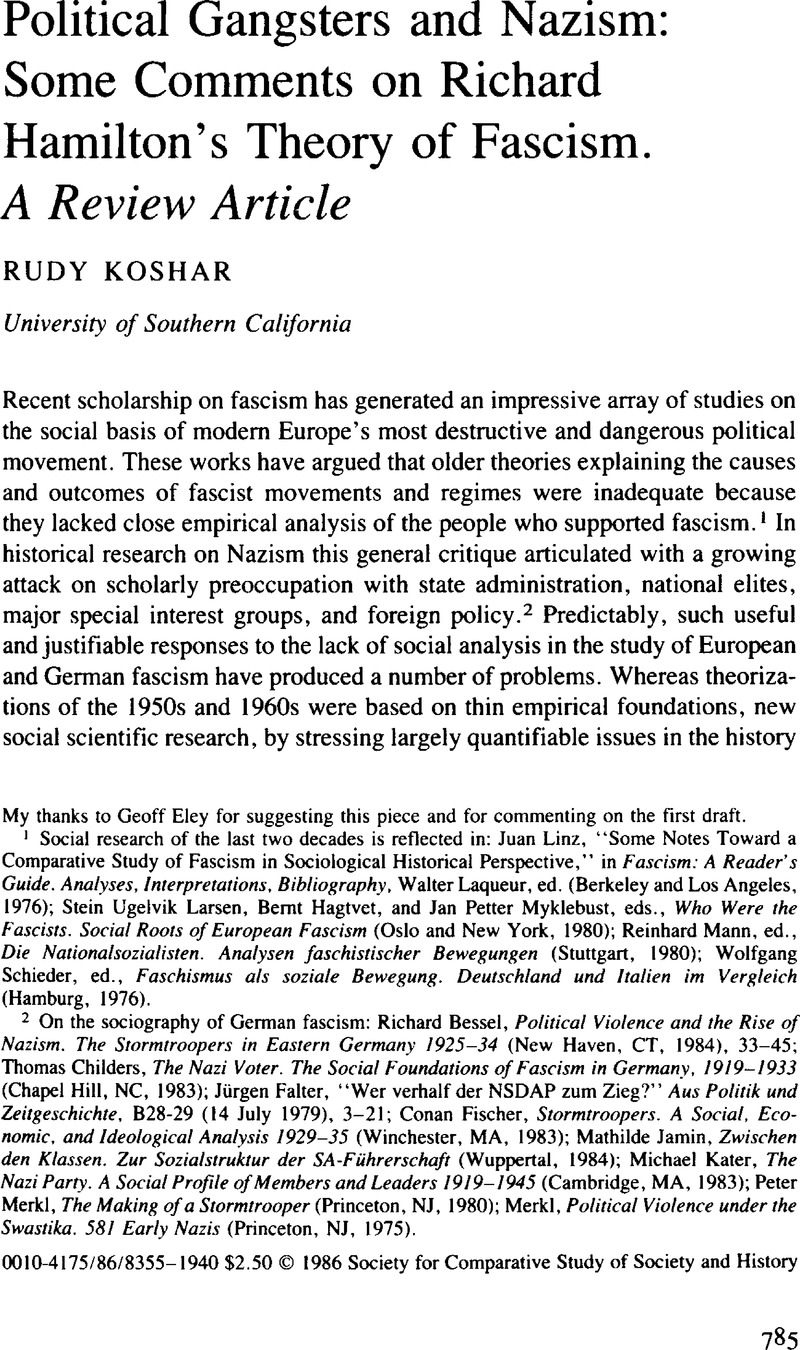No CrossRef data available.
Article contents
Political Gangsters and Nazism: Some Comments on Richard Hamilton's Theory of Fascism. A Review Article
Published online by Cambridge University Press: 03 June 2009
Abstract

- Type
- CSSH Discussion
- Information
- Copyright
- Copyright © Society for the Comparative Study of Society and History 1986
References
1 Social research of the last two decades is reflected in: Linz, Juan, “Some Notes Toward a Comparative Study of Fascism in Sociological Historical Perspective,” in Fascism: A Reader's Guide. Analyses, Interpretations, Bibliography, Laqueur, Walter, ed. (Berkeley and Los Angeles, 1976)Google Scholar; Larsen, Stein Ugelvik, Hagtvet, Bemt, and Myklebust, Jan Petter, eds., Who Were the Fascists. Social Roots of European Fascism (Oslo and New York, 1980)Google Scholar; Mann, Reinhard, ed., Die Nationalsozialisten. Analysen faschistischer Bewegungen (Stuttgart, 1980)Google Scholar; Schieder, Wolfgang, ed., Faschismus als soziale Bewegung. Deutschland und Italien im Vergleich (Hamburg, 1976).Google Scholar
2 On the sociography of German fascism: Bessel, Richard, Political Violence and the Rise of Nazism. The Stormtroopers in Eastern Germany 1925–34 (New Haven, CT, 1984), 33–45Google Scholar; Childers, Thomas, The Nazi Voter. The Social Foundations of Fascism in Germany, 1919–1933 (Chapel Hill, NC, 1983)Google Scholar; Falter, Jürgen, “Wer verhalf der NSDAP zum Zieg?” Aus Politik und Zeitgeschichte, B28–29 (14 July 1979), 3–21Google Scholar; Fischer, Conan, Stormtroopers. A Social, Economic, and Ideological Analysis 1929–35 (Winchester, MA, 1983)Google Scholar; Jamin, Mathilde, Zwischen den Klassen. Zur Sozialstruktur der SA-Führerschaft (Wuppertal, 1984)Google Scholar; Kater, Michael, The Nazi Party. A Social Profile of Members and Leaders 1919–1945 (Cambridge, MA, 1983)Google Scholar; Merkl, Peter, The Making of a Stormtrooper (Princeton, NJ, 1980)Google Scholar; Merkl, , Political Violence under the Swastika. 581 Early Nazis (Princeton, NJ, 1975).Google Scholar
3 The literature is voluminous. An overview of earlier theorizing on fascism may be gained from the following useful works. For Marxist theories: Abendroth, Wolfgang, ed., Faschismus und Kapitalismus. Theorien über die sozialen Ursprünge und die Funktion des Faschismus (Frankfurt/M., 1967)Google Scholar; and Rabinbach, Anson G., “Toward a Marxist Theory of Fascism and National Socialism,” New German Critique, 3 (1974), 127–53CrossRefGoogle Scholar. For mass society theories: Hagtvet, Bernt, “The Theory of Mass Society and the Collapse of the Weimar Republic: A Re-Examination,” in Who Were the Fascists, Larsen et al., eds., 66–117Google Scholar. For a more general impression: Felice, Renzo de, Interpretations of Fascism, Everett, Brenda Huff, trans. (Cambridge, MA, 1977)Google Scholar; and Payne, Stanley, Fascism. Comparison and Definition (Madison, WI, 1980), esp. 177–90Google Scholar. For criticism of the empirical problems of earlier theories, see Falter, Jürgen, “Radikalisierung des Mittelstandes oder Mobilisierung der Unpolitischen? Die Theorien von Seymour Martin Lipset and Reinhard Bendix iiber die Wählerschaft der NSDAP in Lichte neuer Forschungsergebnisse,” in Probleme politischer Parthipation im Modernizierungsprozeβ, Steinbach, Peter, ed. (Stuttgart, 1982), 438–69Google Scholar. See also the opening remarks on older theorizations in Eley, Geoff, “What Produces Facism: Preindustrial Traditions or a Crisis of a Capitalist State,” Politics and Society, 12, 1 (1983), 53–82.CrossRefGoogle Scholar
4 Princeton, M, 1982.
5 See Childers, Thomas, “Who, Indeed, Did Vote for Hitler?” Central European History, 17, 1 (03, 1984), 45–53CrossRefGoogle Scholar; and Sheehan, James, “National Socialism and German Society. Reflections on Recent Research,” Theory and Society, 13, 6 (11, 1984), 851–67.CrossRefGoogle Scholar
6 Lynd, Robert S. and Lynd, Helen Merrell, Middletown. A Study in American Culture (NewYork, 1956 ed.), 256. Thanks to my colleague Steve Ross for bringing this example to my attention.Google Scholar
7 Linz, Juan, “Political Space and Fascism as a Latecomer: Conditions Conducive to Successor Failure of Fascism as a Mass Movement in Inter-War Europe,” in Who Were the Fascists, Larsen et al., eds., 153–89Google Scholar; and Linz, , “Some Notes Toward a Comparative Study of Fascism,” in Fascism, Laqueur, ed., 3–121.Google Scholar
8 My Social Life, Local Politics, and Nazism: Marburg, 1880–1935 (Chapel Hill, NC, 1986) is an attempt to deal with this issue from the point of view of the small urban polity in Germany.Google Scholar
9 Poulantzas, , Fascism and Dictatorship. The Third International and the Problem of Fascism, White, Judith, trans. (London, 1979 ed.), 71.Google Scholar
10 Johnson, Richard, “Reading for the Best Marx: History-Writing and Historical Abstraction” in Making Histories. Studies in History-Writing and Politics, Johnson et al., eds. with a forward by Mary Jo Maynes (Minneapolis, MN, 1982), 200.Google Scholar
11 Mayer, , The Persistence of the Old Regime, Europe to the Great War (New York, 1981).Google Scholar


